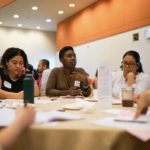It started off with a mission to eradicate type 2 diabetes in this country. God placed the message in my heart when I wrote You Can Afford to Be Healthy.
Type 2 diabetes is an unnecessary disease that is preventable if we had a culture of health in this country. So I ventured out on a journey to discover how to create a culture of health that would make type 2 diabetes a thing of the past.
Mission Statement:
At Raw Food Meal Planner, our mission is to combat Type 2 diabetes nationwide through a holistic approach that combines the principles of a whole food vegan diet, with a special emphasis on raw foods, and the cutting-edge insights of neuroscience. Under the leadership of Samantha Salmon, Certified Integrative Nutrition Coach and Brain Health Licensed Trainer, we focus on educating individuals—especially people of color over the age of 50—about how the brain influences unhealthy food addictions. Our unique methodology also encompasses healing the brain from a bio-psycho-social-spiritual perspective, facilitating emotional regulation and balance. This empowers our clients to view food primarily as a source of nutrition rather than comfort, leading to the shedding of excess weight and the reversal of Type 2 diabetes. Our comprehensive program, which includes personalized meal planning and neuroscience-based training, aims to deepen the understanding of the intricate link between diet, brain health, and overall well-being, guiding our clients toward lasting health transformations.
Vision Statement:
The vision of Raw Food Meal Planner is to forge a future where the integration of a whole food vegan diet, rich in raw foods, and the application of neuroscience principles effectively eliminates Type 2 diabetes. We dream of a world where individuals, particularly those of color over 50, not only reach but maintain optimal health through an understanding of the neuroscience behind food addiction, leading to improved emotional well-being and resilience against stress. By addressing brain health from a holistic viewpoint and prioritizing nutritionally rich foods, our aim is to spearhead a health revolution. We envision communities where making healthy choices becomes second nature, supported by a wealth of knowledge and resources for living a balanced, fulfilling life. Through our dedication, we strive to effect a significant, positive change in the health outcomes of individuals and communities worldwide, leaving a lasting legacy of wellness and empowerment.
5 Year Strategic Plan (Updated Feb 2024)
Year 1: Research and Education (2023)
In 2023, our organization embarked on a pivotal journey to deepen our understanding and commitment to the critical role of nutrition and lifestyle choices in enhancing brain health, managing weight, and preventing type 2 diabetes. This journey was marked by the development and launch of innovative initiatives aimed at educating and empowering individuals to make informed decisions about their health and well-being.
New Year Meal Prep Challenge
Launched at the dawn of 2024, the New Year Meal Prep Challenge represented a significant milestone in our commitment to education on health and nutrition. This program was meticulously designed to provide participants with comprehensive educational materials and resources. The focus was on illustrating the profound impact of nutrition and lifestyle choices on brain health and their effectiveness in releasing excess fat and preventing type 2 diabetes. Through interactive content, personalized meal planning, and supportive community engagement, the challenge aimed to inspire lasting changes in the participants’ approach to food and health.
Thrive Through Food Summit
In addition to the Meal Prep Challenge, 2024 also saw the inauguration of the Thrive Through Food Summit, a groundbreaking event that spotlighted the integral relationship between nutrition and mental health. This summit brought together an array of healthcare professionals, ranging from physicians and authors to coaches and chefs, all sharing a common goal: to elucidate the connection between what we eat and how we feel, think, and behave.
The Thrive Through Food Summit was not just an event but a platform for sharing both personal and clinical experiences related to nutrition’s role in mental health. Speakers at the summit shared cutting-edge research, insightful case studies, and transformative personal narratives that underscored the power of dietary choices in influencing mental wellness. This convergence of expertise and evidence served as a clarion call for a holistic approach to health, emphasizing the need for dietary mindfulness as a key component of mental health strategy.
In our ongoing efforts to disseminate vital information on nutrition, brain health, and the prevention and reversal of type 2 diabetes, we have initiated meaningful collaborations with various community organizations. A notable partnership has been with HeartSmarts, an esteemed organization dedicated to promoting heart health through education and community initiatives. Our collaboration aims to broaden the scope of our educational outreach, ensuring that crucial health information reaches diverse audiences across communities.
Understanding the pivotal role of early education in shaping lifelong health habits, we are actively seeking to extend our outreach to the educational sector. We believe that integrating our research and insights on nutrition and brain health into school curriculums can significantly impact the prevention and management of type 2 diabetes among younger populations. This initiative is geared towards empowering students with the knowledge and tools they need to make informed choices about their health from an early age.
Call to Action: Join Our Educational Mission
As we forge ahead with these educational endeavors, we recognize the immense value of partnerships and collaboration in amplifying our impact. We are keen to connect with schools that share our commitment to enhancing brain health and nutrition education. If you are associated with or aware of any educational institutions that are eager to join forces in this vital cause, please do not hesitate to reach out to us.
Your support can help us extend our reach to more schools, impacting the lives of countless students by equipping them with the knowledge to make healthier lifestyle choices. Together, we can work towards a future where brain health and nutrition are integral components of every young person’s education, fostering a generation that is well-informed and resilient against type 2 diabetes and other lifestyle-related conditions.
Together, We Can Make a Difference
If you believe in the power of education to transform health outcomes and are interested in collaborating with us or know of schools that would benefit from our programs, please get in touch. Your partnership could be the key to unlocking healthier futures for individuals and communities alike.
Let’s continue to work together to spread the message of health, nutrition, and wellness far and wide. Your involvement is crucial to the success of our mission, and we look forward to welcoming more schools and organizations into our community of health advocates.
Year 2: Partnerships and Outreach (2024)
- Collaborative Community Empowerment: In our mission to support at-risk populations, including low-income families, marginalized communities, and the elderly, we are proud to partner with Plant Powered Metro New York. Through this partnership, proceeds from our programs are strategically invested in funding nutrition education programs in churches, specifically aimed at preventing and reversing type 2 diabetes. Together, we’re not only spreading knowledge about health and wellness but also empowering communities with the resources to enact lasting change.
- Forge strategic partnerships with relevant organizations, such as medical associations, public health agencies, and community centers, to expand reach and influence.
- Establish collaborations with healthcare providers, including physicians, nutritionists, and diabetes educators, to integrate raw vegan programs into their practices.
Year 3: Program Development and Pilot (2025)
- Develop comprehensive, evidence-based programs that address nutrition, lifestyle modifications, and brain health to prevent and reverse type 2 diabetes.
- Design coaching and training materials that can be customized to meet individual needs and support sustainable behavior change.
- Recruit and train a team of certified coaches to deliver programs and provide ongoing support to participants.
- Conduct pilot programs in select communities to evaluate the effectiveness and refine the program structure.
Year 4: Program Expansion (2026)
- Scale up programs by expanding into different regions and communities across America.
- Seek funding opportunities and partnerships with philanthropic organizations, government agencies, and healthcare systems to support program expansion and sustainability.
- Collaborate with employers and insurance providers to offer raw vegan programs as part of employee wellness initiatives and healthcare coverage plans.
- Leverage technology to increase accessibility, such as offering virtual coaching sessions and utilizing online platforms for education and engagement.
Year 5: Evaluation, Advocacy, and Sustainability (2027)
- Continuously evaluate the impact and outcomes of the programs through data collection, analysis, and participant feedback.
- Publish research findings and success stories to demonstrate the effectiveness of raw vegan meal planning interventions.
- Advocate for policy changes and community initiatives that promote healthier environments and increase access to nutritious foods and opportunities for physical activity.
- Establish a sustainable funding model through grants, sponsorships, partnerships, and fee-based services to ensure the long-term viability and growth of the mission.
This plan is a general guideline, and may need adjustments based on available resources, partnerships, and other factors. This plan will be regularly reviewed and adapted as needed to stay aligned with the mission of eradicating type 2 diabetes in America.
THANK YOU FOR YOUR SUPPORT
You investing in your health and me as your coach helps me work towards accomplishing this mission.
Here’s where we are right now.
House of Timothy
House of Timothy is a non-profit organization that provides a 12-month residential regeneration program to young adult men dealing with physical, sexual, psychological, spiritual trauma, alcohol and drug addiction, pornography, and sexual addiction. Founded in 2015 by Dr. Willie Montague, the program is designed to be rigorous and includes work schedules, class work, group and individual counseling, and spiritual practices.
Their organization is dedicated to creating an environment that fosters spiritual growth for both staff and residents, employing a holistic approach that considers the mind, body, spirit, and community.
The focus of their mission is to assist men seeking a second chance in life, providing guidance and support for those who wish to embark on a new journey and achieve personal progress within a nurturing and encouraging community.
I have been assisting with fundraising efforts for their nutrition program.
LA Food Policy Council & the Good Food Zone Policy
One of the ways policymakers can help bring about healthy food environments is by encouraging supermarket operators to open in underserved communities.
I helped raise money for LA Food Policy Council, an organization doing many amazing things, one of which is the Healthy Neighborhood Market Network. The goal of the program is to ensure that everyone can access fresh produce within a half a mile of their residence.
Low-income neighborhoods and communities of color have 3x as many small markets than more affluent and white neighborhoods. On average, they also have half as many full-service grocery stores. Limited retail options mean residents in lower income areas have less options for a healthy diet.
The Healthy Neighborhood Market Network program empowers small business owners in low-income neighborhoods to bring good food to their communities. By working with storeowners to champion healthy food access, the Healthy Neighborhood Market Network supports community vitality and economic development. Storeowners receive training, guidance and upgrades to their stores, transforming them into beacons of healthy, affordable food. As a result, communities have more options for living a healthy life.
In addition to that work, I was a co-chair for the Good Food Economy Working Group in 2020 and a member from the inception of the group, which has been advocating for and working on the implementation of The Good Food Zone Policy.
The Good Food Zone policy, which was passed February 2020 and when implemented, will support healthy food businesses in underserved neighborhoods. It’s food-oriented development. It connects food insecure folks to affordable, fresh, healthy food (like mobile grocery stores for example), low income neighborhoods to jobs, and supports businesses in these underserved neighborhoods with the technical assistance and financial support to grow and expand. This will positively affect the City of Los Angeles and has the potential to grow to the County and then nationwide.
You can be mad at the system, which I am, and you can also mobilize for change, which I am. Thank you for joining me in this fight to eradicate type 2 diabetes in this country.
Here is a great article on some major policy moves we need to make in this country.



